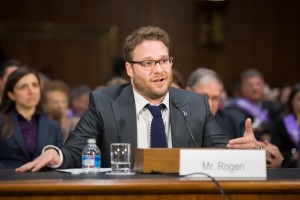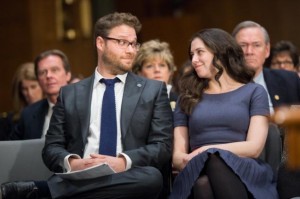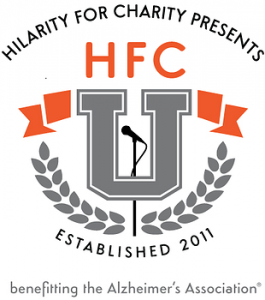Most people—more likely the younger generations—know Seth Rogen from his token role as a hilarious, pot-smoking man-child in films such as Knocked Up (2007) and Pineapple Express (2008). But there’s much more to a man who excels in what he himself calls “genitalia-driven comedy.” The inveterate jokester also happens to be an influential spokesperson and philanthropist for millions of families dealing with Alzheimer’s disease.
Last February, Seth Rogen delivered the opening statement before a Senate hearing on Alzheimer’s research. Using both his brand of irreverent humor and his highly personal, heartfelt perspective, Rogen tells the story of his mother-in-law’s struggle with the disease—a struggle that dispels many of our uninformed notions of the disease and shows us the “real ugly truth.”
“…his mother-in-law forgot who she and her loved ones were—then forgot ‘how to speak, feed herself, dress herself and go to the bathroom herself, all by the age of 60.’”
Before his mother-in-law’s diagnosis at the age of 55, Rogen himself used to be among those who knew Alzheimer’s through movies and television, which make it seem like a simple condition characterized by harmless lapses like forgotten keys and mismatched shoes. And that’s how it was for the first few years, until his mother-in-law forgot who she and her loved ones were—then forgot “how to speak, feed herself, dress herself and go to the bathroom herself, all by the age of 60.” As though such swift descent was not enough to bear, her family and she have to deal with the shame and stigma that would be remedied by opening the conversation on Alzheimer’s and educating the public.
In order to do just this, Rogen and his wife founded Hilarity for Charity, an organization that contributes to research on causes and treatments and provides support for families who know firsthand the massive financial burden of what Rogen reminds us is the most expensive condition in the United States. “If the American people ever decide to reject genitalia-driven comedy, I will no longer be able to afford it. (Please don’t.)”
Hilarity for Charity has also reached out to the Millennials—the Alzheimer’s advocates of the future—by creating programs through which college students can host their own Hilarity for Charity events. So far, 18 universities across the nation have participated, spreading Alzheimer’s awareness and education where it is least present and most needed.
“I dream of the day when my charity will no longer be necessary and I can go back to being the lazy, self-involved man-child I was meant to be.”
In case you aren’t quite sure about the difference between Alzheimer’s and dementia, the former is a particular form of the latter. Dementia is a broad term that can refer to a number of symptoms and other conditions, such as Parkinson’s or Huntington’s disease. Alzheimer’s, however, refers to a specific problem with memory loss, cognition and behavior. Though treatments are available, there is no cure, and the condition worsens over time. (Find out more about the disease at the Alzheimer’s Association.)
Such difficult truths affirm the need for more research and education. As Rogen says at the end of his address, “I dream of the day when my charity will no longer be necessary and I can go back to being the lazy, self-involved man-child I was meant to be.” Until then, it is our job to listen to his story, laugh at his jokes and ask ourselves what we can do for a condition that affects millions of loved ones nationwide.
Watch Seth Rogen’s opening statement here:
More on Alzheimer’s disease from SevenPonds:
- New Awareness Campaign for Alzheimer’s Brain Disease
- What does Alzheimer’s mean for family and friends? An Interview with Cadmona Hall
- Is Copper to Blame? Research Says the Metal May Cause Alzheimer’s

 Comedian Seth Rogen’s Hilarious and Poignant Speech on Alzheimer’s Disease
Comedian Seth Rogen’s Hilarious and Poignant Speech on Alzheimer’s Disease






 “As Tears Go By” by Marianne Faithfull
“As Tears Go By” by Marianne Faithfull
 “The Sea” by John Banville
“The Sea” by John Banville














